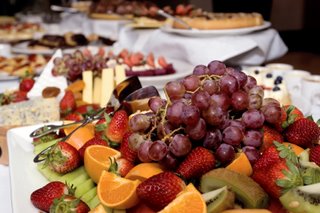We’ve been thinking together about some of those issues on this blog.
One belief that I’ve had to think a lot about over the years is the proposition that you should eat whatever is on your plate. This admonition has deep roots from times past when food was scarce, hard to come by and treated as a limited resource. It is only fair to mention that in many parts of the world today this is still the case, even in America.
I have senior friends who grew up in the Depression and suffered from hunger because they had no food. The effects of that searing experience have not always been easy to shake later even when food was easy to come by. Some virtuous qualities grew out of the austerity such as learning to not let anything go to waste and finding a way to use leftovers creatively. But attitudes, such as “Eat everything on your plate,” which was obviously the wise and grateful thing to do at the time, have also held on.
I grew up hearing “Eat everything on your plate.” My parents knew what the Depression was like and did not forget its lessons.
But I’ve also seen great harm from blindly following the “Eat everything on your plate,” instruction.
What if there is too much food on your plate? Are you required to eat it anyway, stuffing yourself beyond reason?
Oversized proportions are frequently served in restaurants. You order, the chef prepares your order accordingly to management policy, a waitress serves the order, and a plate is put before you.
To listen to mom’s voice in the background that counseled through your growing up years, “Eat everything on your plate,” is to feel obligated to eat it all, or guilty if you don’t.
I broke free from this constrictive mind-grip when I quit listening to those voices and started reasoning my decisions out spiritually.
I grew to love Jesus’ statement, “Man shall not live by bread alone, but by every word that proceedeth out of the mouth of God.” This guidance told me that it wasn’t food that sustained me, gave me life and kept me healthy and strong. It was the word of God, or truth, that supported me.
I may not fully understand this truth to demonstrate it totally. I still eat food in my belief that I need it to live. But nonetheless, Jesus did demonstrate it fully and left us his example to learn from. Step by step, or perhaps, bite by bite, it is okay to prove truth in degrees...
To “take in” the word of God required spiritual mindedness, I decided, and listening to the voice of Truth, and growth in spiritual understanding.
When I sat down for a meal and concentrated on thinking about spiritual truth rather than what was on my plate, I found I ate a lot less. I wasn’t as hungry as before. And my desire for garbage food significantly diminished. I learned from experience that consuming truth in thought, reasoning with it, loving it, and growing with it was far more desirable than any food I put into my mouth.
On the other hand, though, when I neglected to pray during a meal and got all consumed into eating bite after bite, I went into a semi-mesmerized state of thought, ate far more than I needed too, even to the point of stuffing myself.
I began to see a direct trade-off from concentrating on the intake of material food versus concentrating on the intake of spiritual truth. And the latter was far more desirable in effect on my thought and body.
So, when wrestling with, “Eat everything on your plate,” I realized that the issue was not how much food I ate , but how much spiritual truth I thought. When thought was balanced with God, the amount of food I ate was balanced with the right amount of food appropriate to eat.
 “Eat everything on your plate,” is a human instruction, a mortal opinion, often based on fear and not necessarily on divinely inspired ideals, at least in circumstances where lack of food is not an issue. They were words of wisdom that had served their purpose and were ripe for replacement in a society where often way too much food was placed on a person's plate.
“Eat everything on your plate,” is a human instruction, a mortal opinion, often based on fear and not necessarily on divinely inspired ideals, at least in circumstances where lack of food is not an issue. They were words of wisdom that had served their purpose and were ripe for replacement in a society where often way too much food was placed on a person's plate. Rather than getting overworked about answering the question “Did you eat everything on your plate?” perhaps a better question would be, “Is your thought filled with truth and love?” The effects are much better.
What do you think?
Part II tomorrow…







